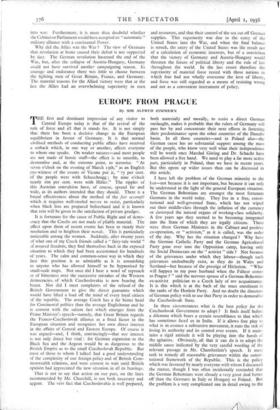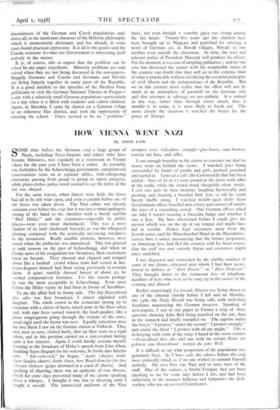EUROPE FROM PRAGUE
By SIR ALFRED ZIMMERN
THE first and dominant impression of any visitor to Central Europe today is that of the revival of the rule of force and all that it stands for. It is not simply that there has been a decisive change in the European equilibrium in favour of Germany. It is that normal civilised methods of conducting public affairs have received a setback which, in one way or another, affects everyone to whom one speaks. On weaker natures—and most people are not made of heroic stuff—the effect is to unsettle, to demoralise and, at the extreme point, to terrorise. " At seven o'clock on the evening of March t3th," as an English eye-witness of the events of Vienna put it, " 75 per cent. of the people were with Schusclmigg ; by nine o'clock nearly too per cent. were with Hitler." The ripples of this Austrian convulsion have, of course, spread far and wide, as its authors intended that they should. There is a brutal effectiveness about the method of the fait accompli which it requires well-steeled nerves to resist, particularly when black lists are prepared beforehand and it is known that rein will be given to the satisfaction of private grudges.
It is fortunate for the cause of Public Right and of demo- cracy that the Czechs are not made of pliable material. The effect upon them of recent events has been to steady their resolution and to heighten their morale. This is particularly noticeable among the women. Suddenly, after twenty years of what one of my Czech friends called a " fairy-tale world " of assured freedom, they find themselves back in the exposed situation to which they had been accustomed for hundreds of years. The calm and common-sense way in which they face this position is as admirable as it is astonishing to anyone who has allowed himself to be hypnotised by small-scale maps. Not once did I hear a word of reproach or of bitterness over the successive mistakes of the Western democracies, of which Czechoslovakia is now bearing the brunt. Nor did I meet complaints of the refusal of the British Government to give the direct guarantee which would have lifted a load off the mind of every loyal citizen of the republic. The average Czech has a far better head for Continental politics than the average Englishman and he is content with the salient fact which emerges from the Prime Minister's speech—namely, that Great Britain regards the Franco-Czechoslovak alliance as a fixed factor in the European situation and recognises her own direct interest in the affairs of Central and Eastern Europe. Of course it was argued—and, I think, convincingly—that our interest is not only direct but vital : for German expansion to the Black Sea and the Aegean would be as dangerous to the British Empire as to the small Czechoslovak Republic. But most of those to whom I talked had a good understanding of the complexity of our foreign policy and of British Com- monwealth relations, and were content to wait until British opinion had appreciated the new situation in all its bearings.
That is not to say that action on our part, on the lines recommended by Mr. Churchill, is not both necessary and urgent. The very fact that Czechoslovakia is well prepared, both materially and morally, to resist a direct German onslaught, makes it probable that the rulers of Germany will pass her by and concentrate their next efforts in fastening their predominance upon the other countries of the Danube basin. In all those countries—and in Poland also—the German cause has no substantial support among the mass of the people, who know very well what their independence will be worth once Marshal Goring and Dr. Schacht have been allowed a free hand. We need to play a far more active part, particularly in Poland, than we have in recent years. But this opens up wider issues than can be discussed in this article.
I have left the problem of the German minority to the last—not because it is not important, but because it can only be understood in the light of the general European situation. The German Bohemians are amongst the most fortunate Germans in the world today. They live in a free, consti- tutional and well-governed State, which has not wiped out their middle-class through the inflation of the currency or destroyed the natural organs of working-class solidarity. A few years ago they seemed to be becoming integrated into the State of which they are legally citizens. There were three German Ministers in the Cabinet and positive co-operation, or " activism," as it is called, was the order of the day. Why has the situation changed ? Why have the German Catholic Party and the German Agricultural Party gone over into the Opposition camp, leaving only the Social Democrats on the " activist " side ? Not because of the grievances under which they labour—though such grievances undoubtedly exist,' as they do in Wales and Scotland—but because of the prestige of Hitlerism. " What will happen to my poor husband when the Fiihrer comes to Prague ? " said the nervous spouse of a German-Bohemian ex-activist politician to a Czech lady of my acquaintance. It is this which is at the back of the mass enrolment in the ranks of the Henlein Party. And no doubt the directors of German policy wish to use that Party in order to demoralise the Czechoslovak State.
In these circumstances what is the best policy for the Czechoslovak Government to adopt ? It finds itself before a dilemma which bears a certain resemblance to that which has sometimes faced us in India. If it allows free play to what is in essence a subversive movement, it runs the risk of losing its authority and its control over events. If it main- tains a rigid attitude it will be playing into the hands of the agitators. Obviously, all that it can do is to adopt the middle cause indicated by the very careful wording of the relevant passage in Mr. Chamberlain's speech. It must seek to remedy all reasonable grievances within the consti- tutional framework of the Republic. This is the policy which was favoured by nearly everyone with whom I discussed the matter, though I was often incidentally reminded that the German Bohemians were already a very great deal better off than the Germans in Italy or Hungary or Poland. But the problem is a very complicated one in detail owing to the intermixture of the German and Czech populations and, above all, to the intolerant character of the Hitlerite philosophy which is momentarily dominant, and has already in some cases found practical expression. It is all to the good—and the Czechs welcome it—that our Government is interesting itself actively in the matter.
It is, of course, idle to expect that the problem can be solved by any paper expedients. Minority problems are only solved when they are not being discussed in the newspapers. Happily Germans and Czechs and Germans and Slovaks are living happily together in many parts of the Republic. It is a good antidote to the speeches of the Henlein Party politicians to visit the German National Theatre in Prague— a city with a relatively small German population—particularly on a day when it is filled with students and school children. Again, in Slovakia, I came by chance on a German village in an otherwise Slav district, and took the opportunity of entering the school. There seemed to be no " problem " there, not even though a swarthy gipsy was sitting among the fair heads. Twenty-five years ago the children here were brought up as Magyars and punished for uttering a word of German (or, in Slovak villages, Slovak) to one another even outside the classroom. In time, the wise and tolerant policy of President Masaryk will produce its effects. For the moment, it is a case of adopting palliatives ; and no one who has discussed the matter with the responsible rulers of the country can doubt that they will go to the extreme limit of what is practicable without sacrificing the essential principles of civil liberty and the independence of the Republic. But we in this country must realise that the effort will not be made in an atmosphere of goodwill on the German side and that attempts at sabotage are not unlikely. It is indeed in this way, rather than through direct attack, that, if trouble is to come, it is most likely to break out. The more closely the situation is watched the better for the peace of Europe.















































 Previous page
Previous page